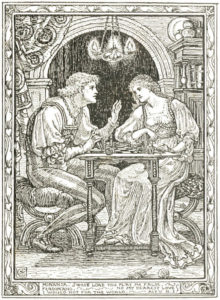Went over to talk to a coworker today who is getting married at the end of the month. Another coworker was also there.
“How was your weekend?” asked coworker #2 of engaged coworker, whose fiance travels.
“Good,” she replied, “Scott’s home. He told me he wants to read The Tempest.”
My arms shot into the air, fists raised, like I’d just scored the winning goal. “Woo!” I exclaim, “Tempest!” I tend to do that. “Is there a particular reason, or is that entirely random?”
She informs me that he “heard there’s a boat in it.” I’m ok with that. The boat may only be in one scene, but it’s a good one. 🙂
Original coworker then comments something to the effect of, “I could only ever read Shakespeare when it was assigned to me. If I just pick it up and start reading I get totally lost.”
“You’ll need to read my next book,” I tell her. “It comes from this very situation that’s happened to me so many times, where grownups tell me that they’ve got nothing against Shakespeare, it’s just that they feel like if they walked into trying to read it or see it they’d be completely lost because they have no idea what’s going on.”
Coworker nods, “Well, exactly.”
“So what I’m doing is working on a series of small guides, just a few dozen pages, that speak directly to this situation. They describe character, plot, famous quotations, important concepts and ideas to watch out for, that sort of thing. Not in a help-you-study-for-your-English-exam kind of way, but just enough so that you can go to a performance of The Tempest and actually feel like you’re going to understand what the heck is going on, and maybe even enjoy it.”
Engaged coworker tells me that maybe her soon-to-be-husband should read it. Other coworker tells me that it’s an idea that “sounds awesome.”
I should have asked for their credit card numbers. 🙂 Always Be Closing!



 to 1 (200k or so misquotes to about a million instances of the actual quote).
to 1 (200k or so misquotes to about a million instances of the actual quote).